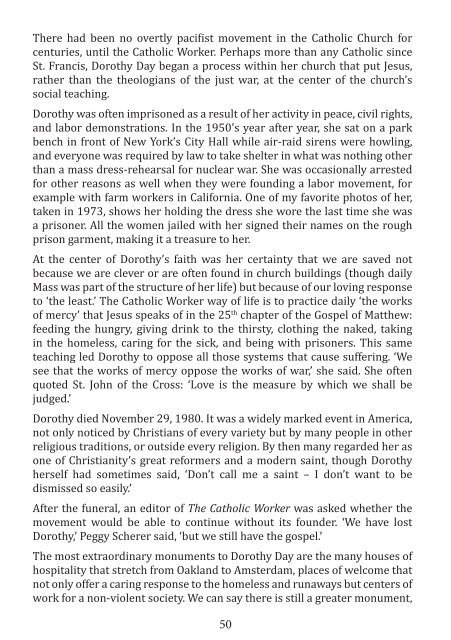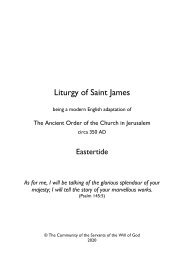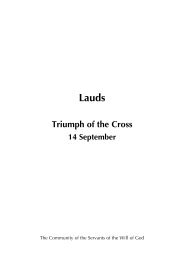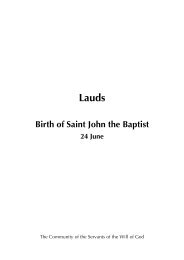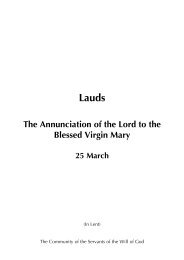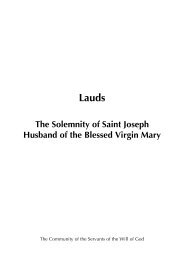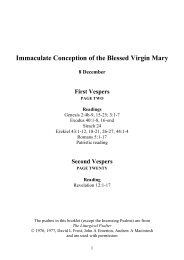In Praise of Holy Women
'Come to the Father' is the official journal of the Anglican Community of the Servants of the Will of God, Sussex, England, a contemplative monastic order for men and women founded in 1938. The aim of the journal is to maintain a dialogue between the Churches - East and West. This issue features articles on Evelyn Underhill, Julia DeBeausobre, Therese of Lisieux, Sister Joanna Reitlinger and Dorothy Day.
'Come to the Father' is the official journal of the Anglican Community of the Servants of the Will of God, Sussex, England, a contemplative monastic order for men and women founded in 1938. The aim of the journal is to maintain a dialogue between the Churches - East and West. This issue features articles on Evelyn Underhill, Julia DeBeausobre, Therese of Lisieux, Sister Joanna Reitlinger and Dorothy Day.
You also want an ePaper? Increase the reach of your titles
YUMPU automatically turns print PDFs into web optimized ePapers that Google loves.
There had been no overtly pacifist movement in the Catholic Church for<br />
centuries, until the Catholic Worker. Perhaps more than any Catholic since<br />
St. Francis, Dorothy Day began a process within her church that put Jesus,<br />
rather than the theologians <strong>of</strong> the just war, at the center <strong>of</strong> the church’s<br />
social teaching.<br />
Dorothy was <strong>of</strong>ten imprisoned as a result <strong>of</strong> her activity in peace, civil rights,<br />
and labor demonstrations. <strong>In</strong> the 1950's year after year, she sat on a park<br />
bench in front <strong>of</strong> New York’s City Hall while air-raid sirens were howling,<br />
and everyone was required by law to take shelter in what was nothing other<br />
than a mass dress-rehearsal for nuclear war. She was occasionally arrested<br />
for other reasons as well when they were founding a labor movement, for<br />
example with farm workers in California. One <strong>of</strong> my favorite photos <strong>of</strong> her,<br />
taken in 1973, shows her holding the dress she wore the last time she was<br />
a prisoner. All the women jailed with her signed their names on the rough<br />
prison garment, making it a treasure to her.<br />
At the center <strong>of</strong> Dorothy’s faith was her certainty that we are saved not<br />
because we are clever or are <strong>of</strong>ten found in church buildings (though daily<br />
Mass was part <strong>of</strong> the structure <strong>of</strong> her life) but because <strong>of</strong> our loving response<br />
to ‘the least.’ The Catholic Worker way <strong>of</strong> life is to practice daily ‘the works<br />
<strong>of</strong> mercy’ that Jesus speaks <strong>of</strong> in the 25 th chapter <strong>of</strong> the Gospel <strong>of</strong> Matthew:<br />
feeding the hungry, giving drink to the thirsty, clothing the naked, taking<br />
in the homeless, caring for the sick, and being with prisoners. This same<br />
teaching led Dorothy to oppose all those systems that cause suffering. ‘We<br />
see that the works <strong>of</strong> mercy oppose the works <strong>of</strong> war,’ she said. She <strong>of</strong>ten<br />
quoted St. John <strong>of</strong> the Cross: ‘Love is the measure by which we shall be<br />
judged.’<br />
Dorothy died November 29, 1980. It was a widely marked event in America,<br />
not only noticed by Christians <strong>of</strong> every variety but by many people in other<br />
religious traditions, or outside every religion. By then many regarded her as<br />
one <strong>of</strong> Christianity’s great reformers and a modern saint, though Dorothy<br />
herself had sometimes said, ‘Don’t call me a saint – I don’t want to be<br />
dismissed so easily.’<br />
After the funeral, an editor <strong>of</strong> The Catholic Worker was asked whether the<br />
movement would be able to continue without its founder. ‘We have lost<br />
Dorothy,’ Peggy Scherer said, ‘but we still have the gospel.’<br />
The most extraordinary monuments to Dorothy Day are the many houses <strong>of</strong><br />
hospitality that stretch from Oakland to Amsterdam, places <strong>of</strong> welcome that<br />
not only <strong>of</strong>fer a caring response to the homeless and runaways but centers <strong>of</strong><br />
work for a non-violent society. We can say there is still a greater monument,<br />
50


